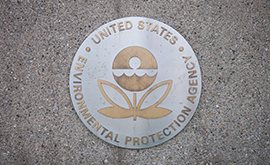Clean Water Current
NACWA Discusses New Blending Rule with EPA
 (May 15, 2018) - NACWA met with EPA on May 9 to discuss the new rulemaking announced by the Agency during Water Week (April 15 – 21) to address the management of peak wet weather flows with blending. EPA is beginning to gather initial input from stakeholders and is planning roundtable discussions to collect additional information in the coming months. A formal request for comments and a public listening session are expected in early Fall, prior to publication of the proposed rule. The government’s Regulatory Agenda lists July 2019 as the target date for a proposal.
(May 15, 2018) - NACWA met with EPA on May 9 to discuss the new rulemaking announced by the Agency during Water Week (April 15 – 21) to address the management of peak wet weather flows with blending. EPA is beginning to gather initial input from stakeholders and is planning roundtable discussions to collect additional information in the coming months. A formal request for comments and a public listening session are expected in early Fall, prior to publication of the proposed rule. The government’s Regulatory Agenda lists July 2019 as the target date for a proposal.
Based on discussions from the May 9 meeting, several types of information will be useful as EPA begins the rulemaking process, such as how utilities are using blending; monitoring practices and data collected during blending; technologies used in side-stream treatment; and economic analysis of the use of blending—including the cost to eliminate blending and provide additional treatment to diverted flows).
The Agency’s previous attempts to provide clarity on blending were never finalized, and the practice has been handled inconsistently across the country ever since, with EPA headquarters asserting that blending should be handled as an illegal bypass. In 2013, the 8th Circuit decision in Iowa League of Cities v. EPA struck down EPA’s regulation of blending, stating that the Agency was imposing regulation without notice and comment, and illegally requiring secondary treatment of flows within the treatment plant. EPA has applied this decision only within the 8thCircuit, and although NACWA requested — in comments last year on regulatory reform — that the decision be applied nationwide, EPA does not seem inclined to do so, opting instead for a more formal rulemaking to address the issue.
NACWA is forming a workgroup that will focus on this issue, and on the Association’s input and comments for the rule. Please contact Cynthia Finley, NACWA’s Director of Regulatory Affairs, if you would like to be a part of this workgroup.